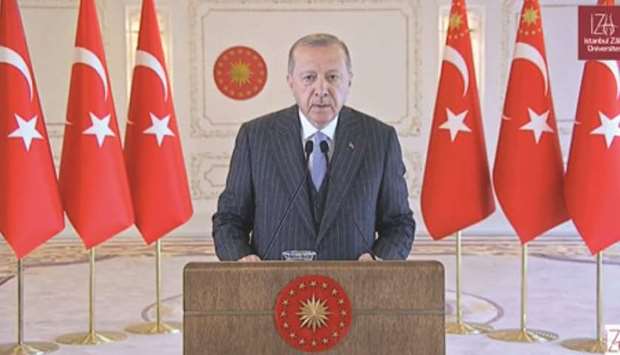The president of Hamad Bin Khalifa University (HBKU), Dr Ahmad M Hasnah, participated in the 12th International Conference on Islamic Economics and Finance (ICIEF), hosted online by the Halkali Campus of Turkey’s Istanbul Sabahattin Zaim University, from June 14-20.
Recep Tayyip Erdogan, President of Turkey, delivered the opening address of the conference, which contributed to a better understanding and interpretation of Islamic finance in the context of the theme, ‘Sustainable Development for the Real Economy’.
Speaking during the opening panel, Dr Hasnah said, “In 2020, the world economy witnessed unprecedented circumstances due to Covid-19 outbreak, which has affected all countries across the globe. The pandemic was accompanied by multiple crises, which demonstrated that the current way of managing the global economy still lacks many ethical, social, and economic values, especially in times of crisis management.”
“In light of these situations, it has become increasingly important to employ the principles of Islamic finance and utilise its institutions to formulate policies and manage the economy and businesses. This requires close co-operation between educational and governmental institutions and the private sector to launch forward-thinking and long-term economic strategies and create diversified, secure, and reliable development plans,” he explained
“Ultimately, these plans will support the future growth of the global economy in a sustainable and equitable way. The strategies will also provide economic alternatives based on moral values in the Islamic world, which strike a balance between the individual and state capitalism embraced by the Western and socialist systems,” added the official.
The conference saw the participation of a number of key figures in the world of Islamic economics and finance, including Turkey’s Treasury and Finance Minister, Berat Albayrak, and Pakistan’s Economy Minister, Abdul Hafeez Shaikh.
Topics discussed during the conference included Islamic money and capital markets in Turkey, entrepreneurship, global financial architecture, the digital economy, the non-profit sector, the Fourth Industrial Revolution and sustainable development. More than 130 policy-makers, academics and researchers from over 30 countries presented their papers via videoconferencing, which attracted at least 5,000 online participants from across the globe.
A number of HBKU faculty participated and presented papers at this conference. The College of Islamic Studies hosted the eighth and tenth editions of this event and fully supported the ninth conference, which was also held at Istanbul Sabahattin Zaim University. The partnership is critical for the advancement of Qatar’s ambitions locally, and for the nation to deepen its footprint in the global arena.
Qatar, Malaysia, and the UK, among others, have played host to the conference since it began nearly 44 years ago. With Qatar declared the fifth largest Islamic finance market in the world for 2019, it is best positioned to continue the conversation on how Islamic finance can salvage global economies.

Recep Tayyip Erdogan speaking at the conference.
